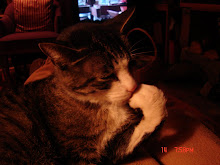I mentioned in the last entry that my mother finally spoke up to contradict her father when she set the record straight about my achievements in high school. But she did find her voice once before and fiercely stood up to him. My grandmother was still alive, so it must have been when I was about thirteen. I was not the catalyst that time. What follows is my father's account.
My dad had a good friend and colleague, Harold Cohen. They enjoyed each other's company and one summer Harold was invited to stay at the cottage for a few days. Harold had never visited the Gatineau so he drove us up for our annual vacation and stayed for a brief visit.
My grandparents were very welcoming and Harold had a good time. Once he left, Grandpa took Mom aside. He was icy cold when he warned her "never, ever bring the likes of him here again". Mom was stunned and asked what he meant by "the likes of him"? "Those people, Jews" was his answer.
Now you have to realize that there was no hint of disapproval evident while Harold was there, so my mother was shocked. Her reaction was quick and spontaneous. She lit into her father for his antisemitism and reminded him that a lot of "our people" gave their lives to save "those people" from the Nazis and that his own family had barely survived a war started by people who held his views. It must have been a pretty impressive response, because my grandfather was much more cautious around my parents after that. There was never another negative word about Jews spoken in her presence.
A year thereafter my beloved grandma died. The glue that brought the family home lost its bond. My grandfather hired a housekeeper and changed his life very little, but for his children and grandchildren life changed a lot. There was no longer that strong pull to the cottage. Meech Lake became a destination rather than a home. Uncle Watson bought his family another cottage on the Rideau River, and Uncle Ken was married to Rosemary by then and their first child Jayne was born. So we all stayed with my grandfather at different times. To make matters worse, my grandfather decided to sell the family cottage to The National Capital Commission.
That decision more than any other changed the family dynamic. What he saw as a chance to capitalize on the push to make Meech Lake a Park, we saw as a betrayal. He signed an agreement that permitted his use of the cottage for life. Upon his death, the property went to the NCC and his children were out of luck. He exercised his ultimate control.
This was done to spite Watson for buying his own place. Grandpa forgot all about his other two children and his grandchildren. The place that had been the hub for his family, no longer promised any future. The family began to pack their emotional bags in preparation for the end. Though we still spent our vacations there till he died five years later, we viewed the place as tenants would a rental. Once he died, we were allowed in briefly to remove personal effects only, the locks were changed and eventually it was torn down to make a public beach and picnic area.
The ultimate irony was the name: not Balharrie but Blanchet Beach (after a neighbour from New England). A French name looked better on a Quebec map than a Scottish one, even if the Blanchets didn't speak a word of French. The vindictive pride of an old man and the politics of the time erased our family history from Meech Lake.
skip to main |
skip to sidebar

Facebook Badge
About Me

- kingmisha
- I'm bigger than a pile of breadboxes, but smaller than a Sherman tank. I'm overeducated, underpaid but very content with my life. I have loved infrequently but intensely. I dated a poet, divorced a Dean, had an affair with a jazz pianist, was engaged to a diplomat, and widowed by my child's father. The men in my life were all very special. Not all grand passions but much loved in their time: Leonard Cohen, Alfred Pinsky, Billy Horn, Wendell Goodin, and Elliot Hirschman. Thanks for the memories... I'm a lapsed artist which doesn't really trouble me because I'm a very successful parent. I lacked the requisite conceit to persevere as an artist. I just couldn't make myself believe that my art came before my child. The world really doesn't need another sculptor (even a good one), but it does need another good human being. It can use all the good human beings we can turn out. I present Mambolica as my evidence so judge for yourselves.